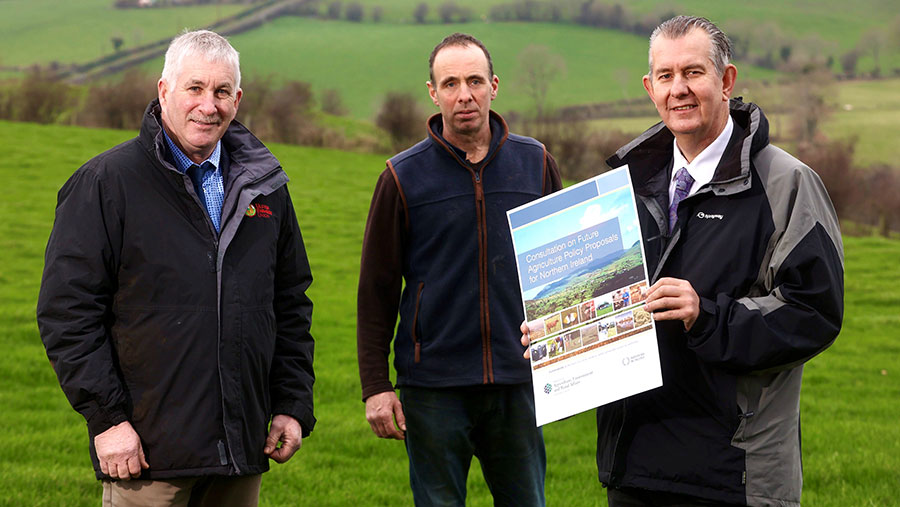Area aids and headage payments key part of NI farm support
 UFU president Victor Chestnutt, Robert Workman, farmer in Larne, and Daera minister Edwin Poots © UFU
UFU president Victor Chestnutt, Robert Workman, farmer in Larne, and Daera minister Edwin Poots © UFU A major consultation has been launched in Northern Ireland seeking views on a wide range of policy measures that will form the basis of future post-Brexit support for farmers – including direct area payments and headage payments.
It follows on from the Future Agricultural Policy Framework Portfolio launched by agriculture minster Edwin Poots last August, adding considerable detail to the broad objectives of increased farm productivity, care for the environment, business resilience and a fairer supply chain.
See also: Farm policy gathers pace in UK devolved regions
“This is the first time in almost 50 years that we have a unique opportunity to redefine our agricultural policy and target support to meet our local priorities and needs much more effectively,” said Mr Poots.
“Schemes and support are needed to help farmers develop their businesses, no matter where they farm, to become more efficient and to maximise the sustainable returns they can achieve from the assets at their disposal.”
Consultation details
The consultation, which runs to 124 pages, describes eight main workstreams, as follows:
- A resilience measure – with area-based income payments to provide a basic safety net. This will account for the bulk of the support budget initially, but will be reduced over time. It will include “farm sustainability standards” to replace current cross-compliance.
Plus…. A crisis framework – including market intervention and private storage aid in the event of a market collapse. - A headage sustainability package – accounting for 17% of the budget, this will include support for suckler cows and a “beef transformation measure”.
- A farming for nature package – with bespoke agri-environment schemes which, over time, will become the “central plank” of support in NI.
- Farming for carbon measures – providing incentives and training to cut emissions.
- An investment measure – with grants to increase productivity and to reduce carbon, ammonia and nitrate emissions.
- Knowledge measures – with an emphasis on continual professional development.
- A generational renewal measure – to transition farming businesses to those with better training and skills, and who have “a longer investment horizon”.
- Supply chain measures – encouraging farmer collaboration and a fairer supply chain.
The consultation explores each of these in considerable detail, and then asks stakeholders a series of specific questions relating to each.
For example, on the resilience measure it explains that future payments will be made on an area basis, triggered by land entitlements, which will continue to be transferable. The minimum claim size will rise to 10ha.
The money will only go to active farmers – excluding those who simply have grass-selling businesses or just manage their land to achieve good agricultural and environmental condition (GAEC) – and payments will be progressively capped above £60,000.
Reaction
Initial farmer response has been positive.
Ulster Farmers’ Union (UFU) president Victor Chestnutt described it as a once-in-a-generation opportunity to redefine agriculture policies and support.
“It’s extremely positive that the focus of the new future ag policy is on active farmers and growers,” he said.
“Working to meet the growing demand for food both at home and abroad, while also protecting the environment and meeting the demands of climate change, it’s vital that our members are equipped with the right tools to become more efficient resulting in maximum returns.”
The consultation runs until 15 February 2022, and the UFU is encouraging its members to take time over the Christmas period to read the document and make their opinions known.
It is also planning a series of presidents’ roadshows in January.
